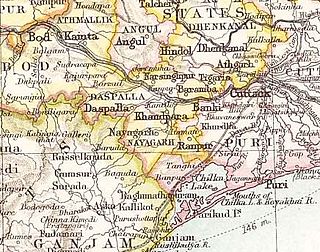
Bardhaman, officially Bardhaman Sadar, is a city and municipality in the state of West Bengal, India. It is the headquarters of Purba Bardhaman district, having become a district capital during the period of British rule. Burdwan, an alternative name for the city, has remained in use since then.

Bongaigaon district (Prpn:ˈbɒŋgaɪˌgãʊ) is an administrative district in the state of Assam in northeastern India. The district headquarters are located at Bongaigaon. The district occupies an area of 1,093 km2.

Indian feudalism refers to the feudal society that made up India's social structure until the formation of republic of india in the 20th century..
Panchet is a census town in Nirsa CD block in Dhanbad Sadar subdivision of Dhanbad district in the Indian state of Jharkhand.

The Bardhaman Raj, also known as Burdwan Raj, was a zamindari Raja estate that flourished from about 1657 to 1955 in the Indian state of West Bengal. Maharaja Sangam Rai Kapoor, a Khatri from Kotli, Punjab, who was the first member of the family to settle in Bardhaman, was the original founder of the house of Bardhaman, whereas his grandson Abu Rai, during whose time the zamindari started flourishing, is considered to be the patriarch of the Bardhaman Raj family.
The Singranatore family is the consanguineous name given to a noble family in Rajshahi of landed aristocracy in erstwhile East Bengal and West Bengal that were prominent in the nineteenth century till the fall of the monarchy in India by Royal Assent in 1947 and subsequently abolished by the newly formed democratic Government of East Pakistan in 1950 by the State Acquisition Act.

Jalsa (transl. Fun) is a 2008 Indian Telugu-language action comedy film written and directed by Trivikram Srinivas and produced by Allu Aravind, under the Geetha Arts banner starring Pawan Kalyan, Ileana, Parvati Melton, Kamalinee Mukerji, Mukesh Rishi and Prakash Raj. The soundtrack of the film composed by Devi Sri Prasad, was launched on 29 February 2008. The film was released on 1 April 2008.
Madhukunda is a census village under Bailtora village panchayat of Santuri intermediate panchayat in Purulia district in the Indian state of West Bengal. It is located on the south bank of Damodar River. It is served by the post office at Sunuri.

The Sonbarsa Raj was a medieval chieftaincy and later a zamindari (estate) during British Raj in modern-day Bihar, in erstwhile Bhagalpur district. It was controlled by the Gandhavariya Rajputs.

Tekari Raj was a zamindari estate belonging to a family of the Bhumihar community in South Bihar. They controlled 2,046 villages on their estate, which covered a 7,500 square kilometres (2,900 sq mi) area, near to the town of Gaya.

History of Bankura district refers to the history of the present Bankura district in the Indian state of West Bengal.
Dishergarh is a neighbourhood in Asansol of Paschim Bardhaman district in the Indian state of West Bengal. It is governed by Asansol Municipal Corporation. It is situated at the border of the Purulia district and Paschim Bardhaman district in West Bengal. The State Highway 5 (SH5) passes through Dishergarh. The neighbourhood is located on the banks of Damodar River.

Kashipur is a village, with a police station, in the Kashipur CD block in the Raghunathpur subdivision of the Purulia district in West Bengal, India. Kalloli, where the CD Block headquarters are located, is close to Kashipur.

Asansol Junction is a railway station of Eastern Railway in Asansol of Paschim Bardhaman district in the Indian state of West Bengal. The station is on the Howrah–Delhi main line. It is the 8th busiest railway station in India in terms of frequency of trains after Kanpur Central, Vijayawada Junction, Delhi Junction, New Delhi, Ambala Cant, Howrah and Patna Junction. Around 171 trains pass through the station daily. It serves Asansol and the surrounding areas.
Sir Uday Chand Mahtab KCIE the Maharajadhiraja Bahadur of Bardhaman Raj, K.C.I.E., was the last ruler of Burdwan Raj, who ruled from 1941 until 1955, when the zamindari system was abolished in India.

Banki or Bānki State was a princely state in Odisha during the British Raj. Its capital was Banki, in the western part of present day Cuttack district.

Jhargram Raj was a zamindari which occupied a position in Bengal region of British India. The zamindari came into being during the later part of the 16th century when Man Singh of Amer was the Dewan/Subahdar of Bengal (1594–1606). Their territory was centered around present-day Jhargram district. Jhargram was never an independent territory since the chiefs of the family held it basically as the zamindars of the British Raj in India after Lord Cornwallis's Permanent Settlement of 1793. Although its owners were both rich and powerful, with the chiefs of the family holding the title of Raja, the Jhargram estate was not defined as a Princely State with freedom to decide its future course of action at the time of Indian independence in 1947. Later, the Vice-Roy of India agreed to recognize Jhargram as "Princely State" after the Second World War, but the proposal taken back as the British had decided to give independence to India.

Baranti is a small tribal village in the Santuri in the Raghunathpur subdivision of the Purulia district in the Indian state of West Bengal. It is situated beside Baranti Lake. This is a growing but quiet tourist spot.

Telkupi is a submerged location of archaeological interest in Purulia district of West Bengal, India. The area, along with most of the temples situated there, was submerged in 1959 as a consequence to the construction of a dam across Damodar river at Panchet in Dhanbad district, then in Bihar.
Damodar Shekhar was the first king of the Panchkot Raj family. Panchkot Raj family belonged to the Kudmi Mahato community.















